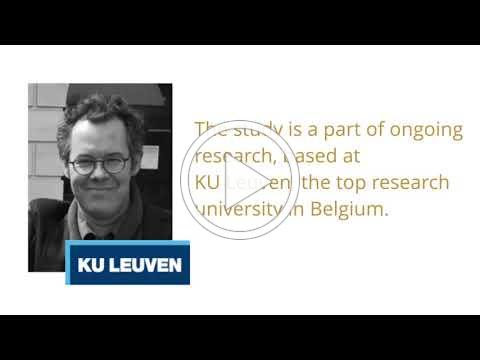
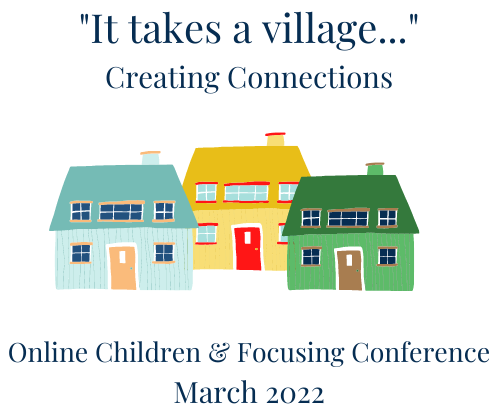
We are excited to announce the upcoming Children's Focusing Conference, being held March 25 - 27, 2022. The goal of this conference is to highlight the diversity and creativity in our Children's Focusing Community by exploring the many ways we can support children and each other through Focusing and connections.
Taking place online over three days, the Conference will feature an array of workshops and presentations designed for for anyone interested in learning these unique Children's Focusing skills.
Click here to view the tentative schedule and register!
Now Published!
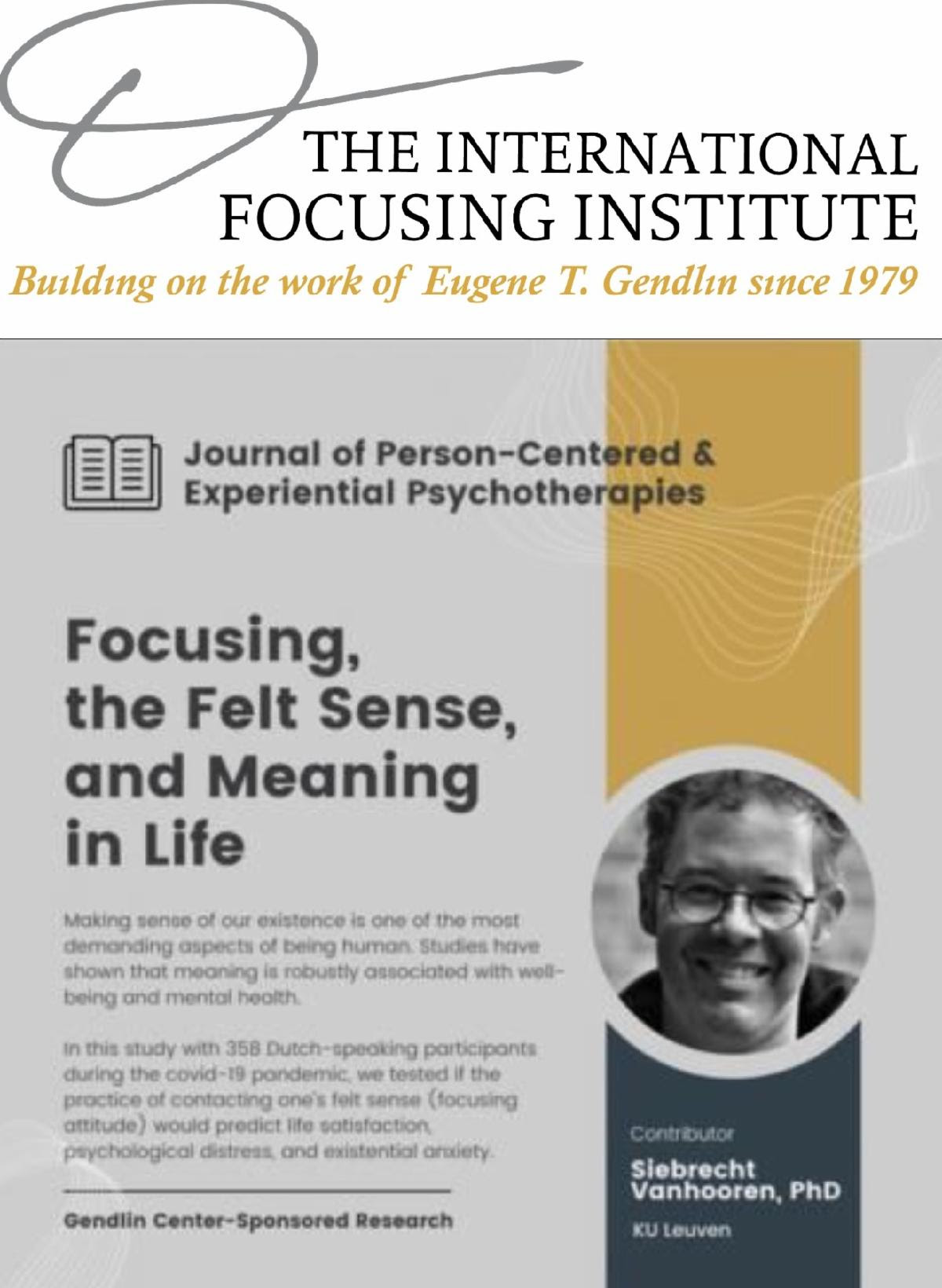
When Gene Gendlin passed away, the Board of The International Focusing Institute felt that the best way to honor him would be for the Institute to promote academic-level research in both philosophy and psychology. Many of you gave financial gifts to the then-newly-formed Gendlin Research Center. Your gifts allowed us to create the Gendlin Grant for Original Research in Psychology, and the inaugural grant was given to Dr. Siebrecht Vanhooren of KU Leuven University in Belgium. He has now published his research in the Journal of Person-Centered and Experiential Psychotherapies. Please read his abstract at gendlincenter.org. The video below gives a brief overview of his findings. To read the full report, one must have access to the journal through a person subscription or a library.
Thank you to all the donors who have made such high quality research possible so soon after Gene’s passing. We have given out the second grant to Dr. Mohamed Altawil (read more at gendlincenter.org) and in the year to come, we will also be introducing a prize for philosophical research.
If you'd like to donate to this work, please go to focusing.org/donate and under "Fund" choose "Gendlin Center for Research."
Darryl Commings
by Jocelyn Jacks Kahn
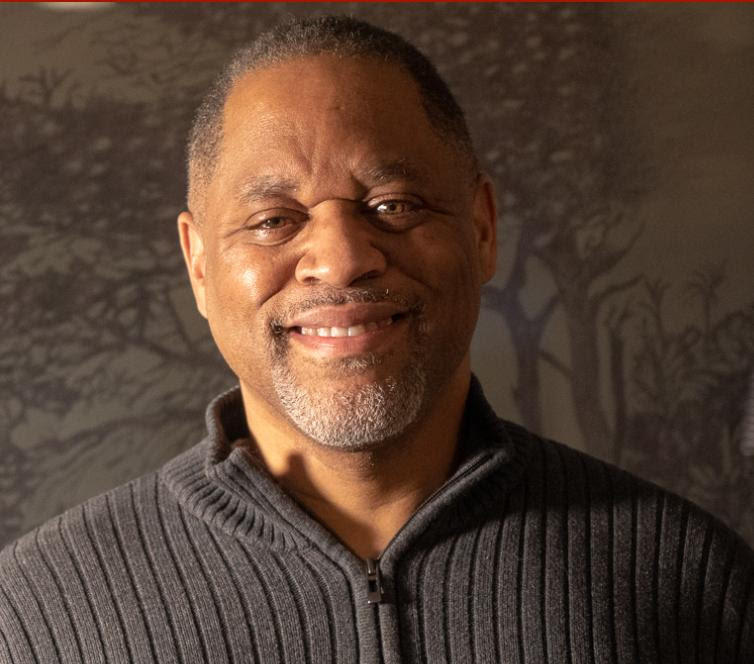
"And I got a real clear sense of it in that moment:
that it's not about trying to heal up an isolated person." - Darryl Commings
First of all, congratulations on becoming a member of the TIFI Board. And congratulations on being one of the organizers of the "Embodied Liberation: The Felt Sense & Social Justice” Felt Sense Conference, as well as a presenter!
Thank you. We had an amazing team organizing the Conference, and I feel more intertwined with the Focusing community because of my involvement.
What I always love to start with is the initial journey to Focusing. How did you come to Focusing?
Like many of us, I ran into Gene’s original book, Focusing, and tried to do it by myself. I failed miserably. That was in the mid-80s, and I sat on it for about 20 years. Then in the early 2010s I ran into an advertisement from Focusing Resources – and sat on that for a little while longer. Finally, a couple of years after a significant health challenge, and really wanting to find other ways of growing and healing, I decided that I would at least take a Level One Inner Relationship Focusing class and see how that goes.
I finished up the Inner Relationship Focusing series of classes sometime around 2016. After a couple of years of Focusing partnership, I began to sense that it had had an effect on me. I could tell that I was different from when I started. And then I began realizing some connections between Focusing and the work I was doing in ministry. In fact, it was after I graduated with my master's from divinity school that I decided to go through Focusing certification. I felt it might have some relevance to the doctorate in ministry that I am currently pursuing.
And before we continue, can you please say a little bit more about the difference you sensed in yourself after learning Focusing?
I felt more present in ways that I didn't before. I felt more aware of my inner world. There’s a real qualitative difference. I was literally a different person.
Slowing down and listening into the question… There's a sense of a connection to me in this process. I've opened up in ways that weren’t available to me before.
There's something about Focusing on a regular basis that is inherently affirming. Something about having a partner to reflect back; really starting to sense that, “Wow, there are ways that I can see myself and be in my own process that just weren't there before.”
Is there anything that comes to mind as the most significant change?
Externally, it shows up in how I relate to others. I sense more than I did before. There's more of a sense of the space of relationship. I'm more aware of the give and the take, the presence of somebody else there with me; the taking in of what I'm hearing and the checking of it.
Internally, it's more like slowing down, more a sense of developing the practice of just checking and seeing “Does this feel right or not? Does this make sense? Does this feel like a direction I can head that might be fruitful?” Also, there's more a sense around my own boundaries and more of a willingness to respect that sense in me that says either, “Okay, this is far enough” or “Come closer.”
Yes, boundaries as a sense of: Here's my space. And I can have some authority in my space and how I share that space with others.
Just that willingness to slow down and say, “Okay, does this work or not; is it right or not?” Or maybe even a more comprehensive way of saying it is that there’s just more truth-telling towards my own experience.
And I would also say that I feel more open-ended – more sense of possibility of where I can go, of ways I can grow as a person.
Right now, I can sense possibilities. Before really getting into this work, I felt more closed off in a front-end kind of way – like, the space in front of me was more limited. Whereas now what I sense in front of me is a frontier that has an openness to it.
On Setting Up a Reading Group to Explore
Gendlin’s Philosophy

Suggestions emerging from a Roundtable on the topic
In November 2021, we hosted two Roundtables with the theme "On Setting Up a Reading Group to Explore Gendlin’s Philosophy." These conversations (with over 45 participants) were very fruitful. Here, we set out some of the insights, suggestions and tips that arose from the conversations. We hope that you will find them useful and that you will be encouraged to set up your own reading group. Studying Gendlin’s philosophy can be a transformative experience in so many ways in our work as Focusing teachers, guides and practitioners.
Forming a group
The topic of "Where to find potential group members?" came up several times. The answer that emerged was to "work with what’s there" – if you are part of a network, a changes group or any other gathering, this may offer an opportunity to find people. If local opportunities are not readily available, an international reading group can offer an opportunity as they are now well supported through available technology.
One of the participants highlighted the importance of a good "fit" in forming a group that will thrive. We agreed that diversity brings real benefits in terms of experience and perspective, and can prevent "groupthink." Having a good "fit" is dependent upon the interests and motivations of the participants, and upon the group approaching the exploration in a felt-sensing way.
Acknowledging obstacles and how they might be overcome
There are many people in our community for whom English is not their first language. This hurdle can be difficult to overcome, but we hope that translations will facilitate wider reading in the future. Some of Gendlin’s work has already been translated into other languages (see the "World Languages" section of the website as well as the "Articles" section for more information on available texts).
Gendlin's language may be experienced as abstract and opaque at times, particularly when first exploring his work. This lack of comfort with the vocabulary is not really surprising when we consider that Gene was creating new concepts. One suggestion was to follow Gene’s own advice: the best way to read philosophy is “many times.”
Some participants also shared Rob Parker’s suggestions on ways to work through language difficulties:
- Keep a glossary of terms - add to what you’ve written as understanding develops.
- Try to “Read Gendlin from the place from which he writes.” He is finding new concepts that are about an experiencing process, not about creating fixed concepts.
The courses offered by TIFI that feature Gendlin’s philosophy can be a helpful resource, and several people have attended these. Some raised questions about the accessibility of the content, while others observed that personal reading or reading in a group can create a readiness to participate in these forums as it facilitates a deeper engagement with the work over time. The Institute also has plans to offer reading groups beginning this year, so please stay tuned for those announcements.
Ways of reading together
A helpful suggestion was to begin the reading session with a simple attunement. This can help people to enter into a "listening mode," aware of what is going on for other people in the group and helping to find a pace that is in tune with the group as a whole.
There was a lively conversation about what "reading in a Focusing way" might mean for a group. Some suggested that it’s about taking time to sense into the text, seeing how particular aspects "land;" taking pauses and allowing the sense of the whole thing to form. Another suggestion is to "read the text like a poem – exploring what is resonating, what strikes me about that, what touches me?"
Taking turns reading aloud can also help. Some people may wish to have the opportunity to read back what has been read out loud.
There is no need to rush the reading or have "page targets" (where the group tries to get to a certain page by the end of a session). One paragraph might take up a whole session. Members of the group are free to pause the process; this provides safety for everyone. Accompanying anyone who is “stuck” or “unclear” is always worthwhile, as it can clarify and "open up" the text for everyone. All of this allows time for each person to make their contribution, offering different perspectives and understanding, and teasing out the text with examples from life.
At times, when the reading seems hard, it can be helpful to simply go on and read the next paragraph; this can change the dynamic. Taking time with those "aha" moments when they come can be wonderful!
What text to read?
Following your interests is a good way to choose a Gendlin text. For reference, the Philosophy of the Implicit section of TIFI’s website has suggestions on "core texts" to get you started, and many of Gendlin’s papers are freely available at the Gendlin Online Library.
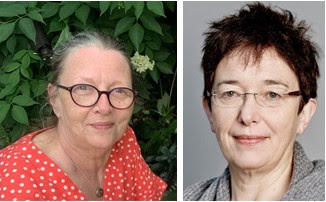 |
Mary Jennings, Focusing Coordinator (right), and Margaret Quinn, Focusing Trainer (left), are part of a reading group in Dublin, Ireland. They would like to thank Susan Lennox for her work in facilitating this and so many other Roundtables over the years. Thanks too to Rebecca Mueller who had the initial inspiration for this Roundtable on setting up a reading group. Mary and Margaret, along with Elaine Groggin, are the new organizers of the Roundtables gatherings for members. |

At the February Board meeting, along with hearing final reports of the success of TIFI in 2021, the Board gave approval to proceed with developing a Thinking at the Edge (TAE) Proficiency Award process. Board member Evelyn Fendler-Lee is working with Executive Director Catherine Torpey and former Board member Hanspeter Mühlethaler, who in turn are consulting with current teachers of TAE. They will continue to fill in the details of the process and will report to the Board on their progress.
The Board is enthusiastic to support the development of TAE, a second practice alongside Focusing, developed from Eugene Gendlin’s Philosophy of the Implicit. The Board believes that creating a TAE Proficiency Award will bring more attention to this process.
Evelyn also announced that Dr. Akira Ikemi has agreed to chair the Steering Committee of the Gendlin Research Center. Dr. Ikemi is a well-respected presenter at TIFI conferences and known for his outstanding research on Focusing. The Board is delighted to have such an accomplished chair to succeed Kevin Krycka in the task of leading this distinguished group of academics in philosophy and psychology. Their role is to promote academy-level research based on the work of Gene Gendlin.
 |
Thank you to Kevin Krycka for his four years of dedicated service to chairing the Gendlin Research Center. Kevin will continue to participate as a member of the committee.
|
 |
We bid a fond farewell to Peter Afford, whose term was to end this summer, but he has chosen to depart from us a few months early. Peter has had a very positive influence in helping us to add to our organizational structure, with a timeline for annual reports, the hiring of Renee La Roi to help us stay on top of tasks for the website, and having our Executive Director submit "Goals and Plans for the Year to Come" each year. Thank you, Peter, for your three years of dedicated service! |
Processing my Daughter's Death
by Richard Dawson
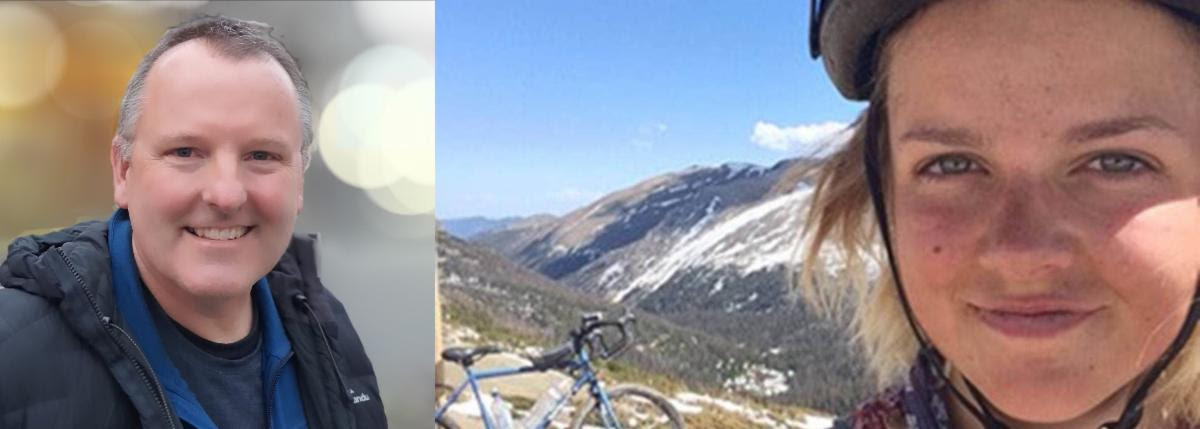
In recent months I have been introduced to the activity of Focusing. This has been a gift for me, for I have been wanting help in relation to coming to terms with the death of my nineteen-year-old daughter Fyfa, on 30 October 2019. She was flattened by a concrete truck while doing what she loved, namely, cycling. This article, giving attention to Focusing, is written primarily for the purpose of processing Fyfa’s death. I hope this processing can be put to good use in, among other places, a restorative justice conference.
Some months after Fyfa’s death, a friend mentioned her and asked me, “How do you feel?” From memory, that was the first time someone had asked me that or a similar question, and I had little idea how to answer, and I felt at a loss and a bit inadequate, unable to respond to a simple question. (I did feel moved that he cared.) I had felt flickering moments of grief, and a lot of blank nothingness. Currently (I write this paragraph in Oct. 2021), part of me wonders if 'I’ (another part) am heartless and unfeeling. Part of me knows this is not true, but is surely wounded by that other part. (A wound upon the other wound of Fyfa’s death.) I would love to know how to prod a valuable inner conversation. Part of me suspects another part is afraid of being overwhelmed by the reality of Fyfa's death. I hope that by doing Focusing a sequence of questions will emerge that can start my many selves off on a healing process. I wrote to Focusing teacher and guide Ann Weiser Cornell, telling her that situation as I have just told it, asking her for a “tip”, in the form of a sequence of questions. She wrote back and expressed, among other feelings, concern that given that the “horrific” event happened “just two years ago”, “I suspect you are still in shock.” This possibility had not occurred to me. I was reassured when she said, “I don’t think there is any reason to doubt that you are already on a healing journey.” Phew! A sigh of relief emerged. Ann then said this: “I suspect that in you somewhere there is a very wounded animal crawled into a cave.” This metaphor struck a chord within. I’m not sure “where”. I would need to check this out, tuning in to the “felt sense”. Ann went on to say:
This is not just about what to do, it is about the self-love and self-compassion with which to do it. But perhaps just hearing the metaphor of the wounded animal in the cave has already started a process of trust in your body’s wisdom.
The word “trust” struck another chord within. It felt reassuring. When I reread the message later, I wondered if I lacked the qualities of “self-love” and “self-compassion” worthy of the names. What did these terms mean? The word “com-passion” at a dictionary level means “to endure” something with another person, to put ourselves inside the skin of another, to feel their pain as if it were our own. This makes “self-compassion” … well, um, … fascinating. How does one become more self-compassionate? Some kind of self-listening will be central here.
Just before I contacted Ann, I contacted a Focusing guide, Rachel Hendron. I talked about my feeling of blankness, or my lack of apparent grieving, and my desire to know more about it. We started to talk about the word “curiosity” in relation to the blankness that I have felt. I sensed that the word needed some richness. I said that the present curiosity was an assertive character. The blank part of me was intimidated by this assertiveness. Rachel tried out the word “bossy”, and yes, this seemed to fit. “Aha!” This “bossy curiosity” sits in contrast to a “gentle and wise curiosity” (another “Aha!”), which had a large part in the writing of my book Justice as Attunement. While it might seem good to be interested in the blankness, it would be important not to be “in its face” (Rachel’s fitting words again). Yes! The Blank needs to trust the gentle curiosity -- and it does not trust it yet. An image emerged of the “bossy curiosity”: he is an interrogating self (like an aggressive lawyer), who is wanting to “bash the door down” (Rachel’s fitting words).
I asked: Might I do well to say hello to Blank? Is saying hello going to scare off Blank? Which self within me has asked those last two questions? I can feel my wise, gentle and curious self at work and play. Part of me feels that Blank is just as good as anyone else within me, and is worthy of being heard. Blank is necessary to help my feelings emerge. I had a good sigh of relief in saying those good things about Blank. Part of me suspects that Blank feels noticed or heard. That same part senses that some self-attunement is happening, in the form of harmonizing. Wow!! I have tears welling up in me. I am excited!!
I could tell I am on to something good with this Focusing. Talking with Rachel was like being caught up in a very powerful dream. There were many “Aha!” moments. She had listened to me so well, sometimes finding the right words.
While reading Ann’s The Power of Focusing (1996), I found myself rereading James Boyd White’s book The Gospel as Conversation (2013), which is described in the Foreword as “an exercise in the participatory imagination, placing us in the utterly human context of people who met Jesus, the utterly human context that is the crucible of spiritual transformation.” I was particularly drawn to a passage in a sermon on the death (and resurrection) of Jesus that mentioned how the disciples “grieved brokenheartedly” for him. The words “grieved brokenheartedly” struck a big chord within me. I said a resounding “YES!”: those words fit me in connection to my feelings for Fyfa’s death. “I am not heartless but brokenhearted!” During some more Focusing, these questions arose: What does it feel like to be brokenhearted like the disciples? And what is the feeling for me now? I got an image of the Twin Towers collapsing on 9/11. The planes entering those towers resemble the news of Fyfa’s death. I believe I received a huge shock/trauma but was not conscious of the shock/trauma. I can imagine future Focusing dealing with that shock/trauma.
I took the image of “brokenhearted” to another session with Focusing guide Rachel. We talked about the image of the Twin Towers. I began to feel my whole body trembling. I imagined what it was like in the lower floors when the planes struck: an earthquake. I connected this to hearing the news of Fyfa’s death. I was dazed and confused. Rachel suggested that grief sometimes does not know time, and it can wait until we are ready. My body trembling in the present time was part of the shock I experienced from the news of her death. Rachel mentioned that the trembling could come in waves, and it makes sense to be scared of them if they are big. I recalled the Christchurch earthquakes and how I enjoyed the smaller shakes that caused no physical harm -- it felt like being attuned to nature. Some tremors were, um … joyful! I began trembling again, and this felt joyful. The session itself was starting off joyfully. Rachel wondered if with Focusing we were going to some dark places with a light, and with lightness. YES! Rachel wondered if the source of the trembling was my heart, the heartbroken heart. YES! I breathed a sigh of relief! Part of me sensed that the heart was relieved that it had been heard by “me”. Rachel wondered how the rest of my body was feeling. I could feel an ease in the tension in my shoulders and stomach and neck. I felt, …. Calmer. Yes! Rachel asked what this calm was like for me. Like the feeling during a good massage! I said to Rachel that our conversation was like a massage, without physical touch. But her words and gentle questions were touching me, my heartbroken being. The words were healing words. This session and several after it felt like healing processes.
I can now sense that my brokenheartedness -- my dis-integration -- calls for self-love and self-compassion, as Ann suggested in her email. If the various selves within can all be heard at different points of time, then there may be hope of an harmonic self-attunement, in which we learn to draw out and love our many selves. We might do well to try to internalize “gentle attention” with the hope of coming to learn to draw out and love our many selves.
For me, the activity of Focusing offers an experience of a wholehearted love that I had not known before. Oh, how I wish and wish and wish I could have a chance to offer Fyfa the experience of this kind of wholehearted love. I can hear Fyfa now: “Shit happens, Dad!” She so kindly said those words to me when I was blaming myself -- beating myself up -- for the painful breakup between myself and her mother. I will do well to internalise Fyfa’s kindness.
Meanwhile, I have some pressing questions. How am I to respond to the construction company, Downer and McConnell Dowell, responsible for inadequate safety measures in place at the construction site where Fyfa died? How do I feel now? It is time for more Focusing! I have not thought much about my feelings towards the company, and I imagine this is because I have been in a kind of shock since the death. If I start to attune to what my brokenheartedness means, might I become angry -- an overwhelming anger?
I am anticipating meeting company officials at a restorative justice conference. I imagine that this could possibly be a healing process. Here I am reminded of the remarkable story of Emma Woods, who met with the person responsible for her four-year-old son’s death (Sunday Star, Nov. 7, 2010). She took to heart the view that, among other matters, anyone could make “a foolish or careless mistake that could have had potentially devastating consequences.” And she met (in a restorative justice setting) the person (and his family) concerned in her case in order to “get first-hand experience” of them. The outcome was deeply moving. This gave a rich meaning to the end of young Nayan’s life. (For a discussion of the Woods case in a wonderful book on restorative justice, see the final chapter in Christopher D. Marshall’s, Compassionate Justice (2012).) Having been a facilitator in restorative justice meetings for several years, I have witnessed the potential richness and fruit of such meetings. Let me quote from the final paragraph of Marshall’s book:
Restorative justice is not, strictly speaking, a doctrine of forgiveness, since forgiveness is a voluntary affair of the heart, not a predetermined facet of a formalized process. But by placing the healing of hurts, the renewal of relationships, and the re-creation of community at the center of its agenda, restorative justice paves the way for forgiveness to occur. And when, by grace, it does occur, the ship of justice reaches homeport.
I hope that, with “grace”, justice worthy of the name can be done in Fyfa’s case, and give rich meaning to the end of her life.

Milestones
We want to extend our apologies for any errors in the In Focus New Year issue
of our 2021 Newly Certified list. Please see the revised list below.
As always, we are happy to congratulate the following new Coordinator and
Coordinators-in-Training and welcome them to the International Focusing Institute.
We wish them all the very best in their ongoing endeavors!
New Coordinator
 |
Ria van Hage, the Netherlands - Dutch |
New Coordinators in Training
| Adam de Jong, the Netherlands Coordinator: Aaffien de Vries, supported by Beatrice Blake and Peter Gill Annette Dubreuil, Canada Coordinator: Jan Winhall, supported by Massimo Zarghetta and Peter Gill Paula Riveros, USA Coordinator: Edgardo Riveros |
Maria Vetluzhskih, Russia Coordinator: Charlotte Howorth supported by Svetlana Kutukova Esther Wijs, Netherlands Coordinator: Aaffien de Vries, supported by Ria van Hage and Christien Langeveld |
2021 Newly Certified Members and their Coordinators
(corrected list)
|
Daniela Antonieta Abufhele Meza,Chile, |
Shahar Amergi, Israel, Chen Ein Habar Jessica Anderberg, Australia, Biliana Dearly Shlomit Arbel Emanuel, Israel, Liora Bar Natan Anamaria Aristizabal, Colombia, Edgardo Riveros |
|
|
AmazonSmile allows you donate 5% of your That includes The International Focusing Institute! |



